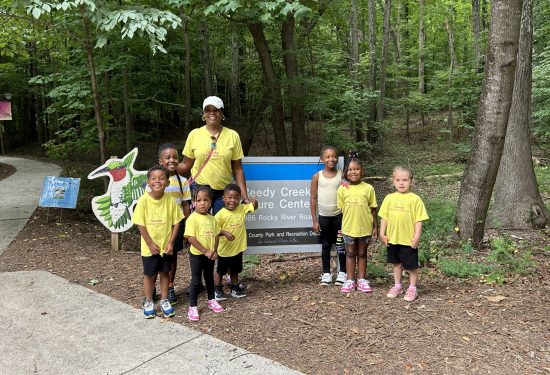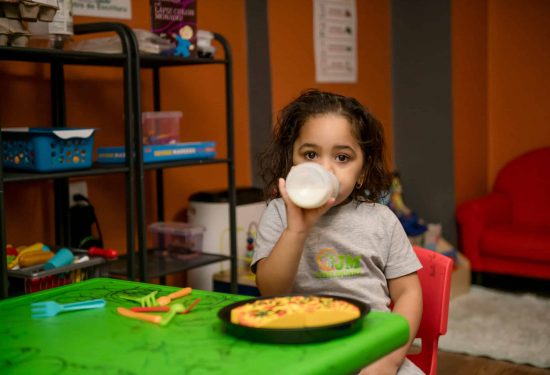More than 12 million children under the age of 13 in the United States are in the care of a home-based child care provider. These providers are often referred to as community anchors because of the extended hours they work to support the families who trust them to care for their children. Many home-based child care providers are available to care for children early mornings, late nights, weekends and holidays, supporting parents’ workforce participation, while providing nurturing, responsive relationships that are the foundation for healthy child development.
Why do home-based child care providers go above and beyond for children and families? It’s not for the compensation. According to the 2020 Early Childhood Workforce Index Home-based child care providers earn an average wage of $11.65 an hour (CSCCE, 2020). This low wage coupled with the rising cost of housing, supplies and other materials providers needed to ensure children receive the best quality care make it challenging for providers to sustain their programs and support their own families. These challenges are often compounded by the student loan debt crisis. A recent study by RAPID, shared that 19% of child care providers carried student loan debt, compared to 17% of the population overall (March 2022 RAPID EC Survey). Although the average amount of student loan debt child care providers carry is unknown, the average amount of student loan debt for someone with a bachelor’s degree in the U.S. is $28,950.
With a high burden of debt and low wages, providers are faced with the challenge of maintaining the cost of running their programs and paying down student loan debt at the expense of sustaining their livelihoods. One provider in Pennsylvania who has been in the field for over 30 years shares her experience:
“I have over $50,000.00 in student loan debt from obtaining my Associates degree to my Master’s degree in Early Childhood Education. I have been a family child care provider for 30 years. I am an educator and caretaker that happens to not work for a non-profit. I am a self-employed, sole proprietor, educated, underpaid, 30 years business owner. Does that mean I don’t need the same support and [public service loan] forgiveness as others in the early childhood education profession?”
Providers are putting in years of work and advancing their education in early childhood education which leads to higher student loan debt and major financial challenges. It’s not surprising, then, that the child care sector has lost workers. While other sectors have recovered, child care is still missing 8% of its pre-pandemic workforce, shrinking the availability of care and creating hardship for families.
Home-based child care providers often start their businesses to meet a community need or their own need for child care. BriAnne Moline, a provider in Montana reflects on what prompted her to open her own center:
“ …while 8 months pregnant with my 3rd child the facility that I was employed at shut down due to financial hardship. Unable to find work due to the upcoming birth of a 3rd child I was encouraged to open my own home-based program.”
This scenario is a common way that home-based providers enter into the field. They begin by filling a child care need for not only themselves, but other local families. After BriAnne’s employment ended at her for-profit organization, she became a home-based child care provider to support not only her family’s child care needs but other family’s needs around her. However, when she made the transition to becoming a home-based provider, her eligibility to access the public service loan forgiveness program went away.
“Shortly after I found out that I would no longer be eligible for student loan forgiveness due to my business not being a non-profit. The irony is that during the first three years of my business operating, I still qualified for food stamps, housing assistance, and Medicaid insurance. Even now, despite expanding and having employees, my own family and I still qualify for medicaid insurance. Early childhood educators do not come into this field for the money, we are called to it to help nurture and shape the next generation of our youth. I feel this is especially true of home based early childhood educators as we invite these children and families into our own homes and our families’ lives.”
Home-based providers deliver a public good, often at great expense to themselves. They are advancing their degrees and ensuring that they are equipped to provide the highest quality for our young children, yet they are being left out of critical federal programs that help public service workers eliminate or reduce the burden of student loan debt. The Public Service Loan Forgiveness program (PSLF) must be revised to include home-based child care providers. According to the existing definition of a “public service job,” home-based providers should already be included. The definition explicitly includes “a full-time job in early childhood education (including licensed or regulated childcare, Head Start, and State funded prekindergarten).” This definition of early childhood education as a qualifying public service job is independent of the entities’ non profit status. Regardless of whether they operate as nonprofits, home-based child care providers must be included in Public Service Loan Forgiveness.
Home-based child care providers were excluded from eligibility, in part, because of the way the Public Service Loan Forgiveness application process was structured. Home Grown has detailed recommendations for the U.S. Department of Education to include child care providers in Public Service Loan Forgiveness. These recommendations include a process for qualifying eligible early childhood educators that is inclusive of home-based child care providers. We strongly encourage administrators and advocates to review the recommendations and proposed application process.
The child care industry is essential. It supports the economy and ensures parents have the much needed support to allow them to work. Relief from debt is a critical retention strategy for the incumbent early childhood education workforce, a workforce that is already in crisis and experiencing a great deal of material hardships. We must support home-based child care providers, as they support so many of our families.




